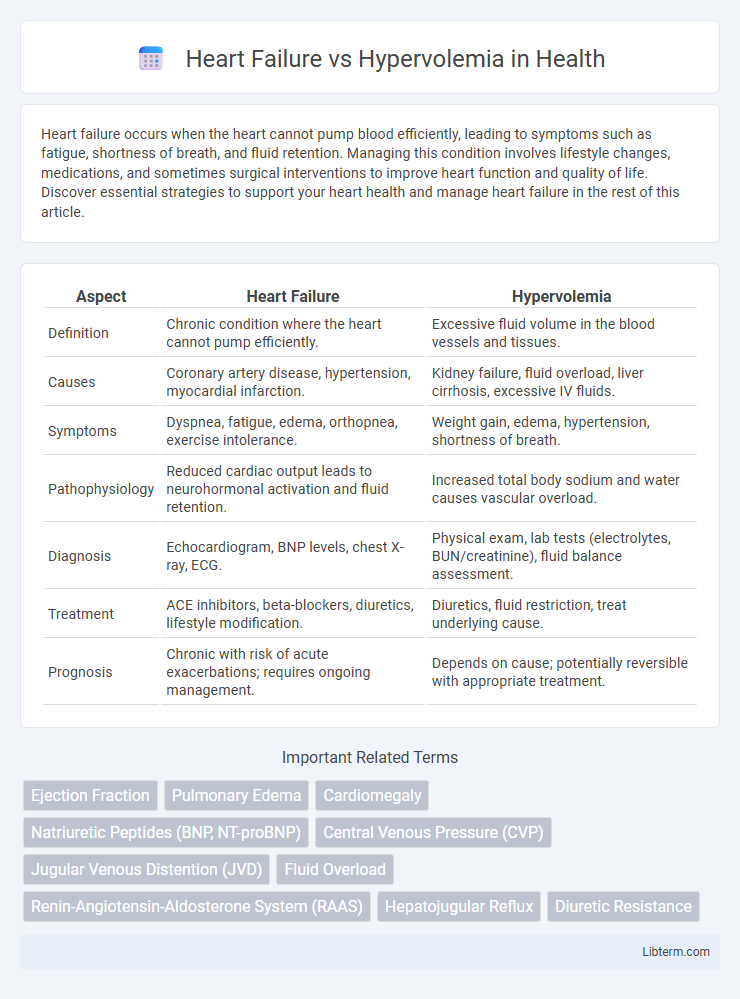Heart failure occurs when the heart cannot pump blood efficiently, leading to symptoms such as fatigue, shortness of breath, and fluid retention. Managing this condition involves lifestyle changes, medications, and sometimes surgical interventions to improve heart function and quality of life. Discover essential strategies to support your heart health and manage heart failure in the rest of this article.
Table of Comparison
| Aspect | Heart Failure | Hypervolemia |
|---|---|---|
| Definition | Chronic condition where the heart cannot pump efficiently. | Excessive fluid volume in the blood vessels and tissues. |
| Causes | Coronary artery disease, hypertension, myocardial infarction. | Kidney failure, fluid overload, liver cirrhosis, excessive IV fluids. |
| Symptoms | Dyspnea, fatigue, edema, orthopnea, exercise intolerance. | Weight gain, edema, hypertension, shortness of breath. |
| Pathophysiology | Reduced cardiac output leads to neurohormonal activation and fluid retention. | Increased total body sodium and water causes vascular overload. |
| Diagnosis | Echocardiogram, BNP levels, chest X-ray, ECG. | Physical exam, lab tests (electrolytes, BUN/creatinine), fluid balance assessment. |
| Treatment | ACE inhibitors, beta-blockers, diuretics, lifestyle modification. | Diuretics, fluid restriction, treat underlying cause. |
| Prognosis | Chronic with risk of acute exacerbations; requires ongoing management. | Depends on cause; potentially reversible with appropriate treatment. |
Introduction to Heart Failure and Hypervolemia
Heart failure is a chronic condition characterized by the heart's inability to pump sufficient blood to meet the body's needs, often resulting from coronary artery disease, hypertension, or cardiomyopathy. Hypervolemia refers to an abnormal increase in blood plasma volume, frequently caused by fluid retention due to kidney dysfunction, excessive sodium intake, or intravenous fluid administration. Both conditions lead to fluid overload but differ in pathophysiology, with heart failure involving cardiac dysfunction and hypervolemia primarily linked to volume expansion.
Definition and Overview of Heart Failure
Heart failure is a chronic condition where the heart cannot pump sufficient blood to meet the body's needs, often resulting from coronary artery disease, high blood pressure, or cardiomyopathy. It leads to symptoms such as shortness of breath, fatigue, and fluid retention, which can overlap with hypervolemia, a state of increased blood volume typically caused by fluid overload or kidney dysfunction. Differentiating heart failure from hypervolemia involves assessing cardiac function through echocardiography and monitoring biomarkers like B-type natriuretic peptide (BNP).
What is Hypervolemia?
Hypervolemia is a condition characterized by an excessive accumulation of fluid in the bloodstream, often resulting from kidney failure, heart failure, or excessive intravenous fluid administration. This fluid overload increases blood volume, leading to symptoms such as edema, hypertension, and shortness of breath. Differentiating hypervolemia from heart failure is critical, as both involve fluid retention but require distinct management strategies.
Causes of Heart Failure
Heart failure primarily results from conditions that damage or overwork the heart muscle, such as coronary artery disease, hypertension, myocardial infarction, and cardiomyopathy. These underlying causes lead to impaired cardiac output and fluid accumulation, distinguishing heart failure from hypervolemia, which typically arises from volume overload due to renal failure or excessive fluid intake. Understanding these etiologies is crucial for accurate diagnosis and targeted treatment strategies in managing heart failure.
Causes of Hypervolemia
Hypervolemia, characterized by an excessive increase in blood volume, commonly arises from causes such as chronic kidney disease, heart failure, excessive sodium intake, and intravenous fluid overload. Impaired renal function limits sodium and water excretion, leading to fluid retention and volume expansion. Understanding these underlying causes is critical for differentiating hypervolemia from heart failure, as treatment strategies focus on managing fluid balance and addressing the root etiology.
Clinical Signs and Symptoms Comparison
Heart failure often presents with symptoms such as dyspnea, orthopnea, paroxysmal nocturnal dyspnea, and peripheral edema, reflecting poor cardiac output and fluid retention. In contrast, hypervolemia is characterized mainly by rapid weight gain, increased blood pressure, jugular venous distension, and generalized edema due to excessive extracellular fluid volume. Both conditions may show overlapping signs like edema and elevated jugular venous pressure, but heart failure uniquely involves reduced ejection fraction and pulmonary congestion evident on clinical examination and imaging.
Diagnostic Differences: Heart Failure vs Hypervolemia
Heart failure often presents with elevated natriuretic peptides (BNP or NT-proBNP) and reduced ejection fraction on echocardiography, indicating impaired cardiac function, whereas hypervolemia typically shows normal cardiac markers but evidence of fluid overload such as increased central venous pressure and peripheral edema. Chest X-rays in heart failure reveal cardiomegaly and pulmonary congestion, while hypervolemia may display vascular engorgement without cardiac enlargement. Laboratory tests for hypervolemia highlight electrolyte imbalances and dilutional hyponatremia, contrasting with heart failure's neurohormonal activation and diuretic response profiles.
Treatment Approaches for Heart Failure
Treatment approaches for heart failure focus on reducing fluid overload and improving cardiac function through the use of diuretics, ACE inhibitors, beta-blockers, and aldosterone antagonists. Lifestyle modifications such as sodium restriction and fluid management complement pharmacological therapy to prevent exacerbations. Advanced interventions may include device therapy like implantable cardioverter-defibrillators (ICDs) and cardiac resynchronization therapy (CRT) for patients with severe left ventricular dysfunction.
Hypervolemia Management Strategies
Hypervolemia management strategies focus on reducing excessive fluid volume through diuretics such as loop diuretics (furosemide) to promote natriuresis and fluid excretion. Sodium restriction and fluid intake limitation are essential non-pharmacologic interventions to prevent fluid overload exacerbation. In severe cases, ultrafiltration may be employed to remove excess fluid directly from the bloodstream, especially when diuretic resistance develops.
Key Differences and Summary
Heart failure is a chronic condition where the heart's ability to pump blood is impaired, leading to symptoms like shortness of breath, fatigue, and fluid retention, whereas hypervolemia refers to an excessive volume of blood plasma, often caused by fluid overload or kidney dysfunction. Key differences include heart failure involving cardiac dysfunction with fluid accumulation secondary to reduced ejection fraction or diastolic dysfunction, while hypervolemia primarily results from increased intravascular fluid without intrinsic heart impairment. Proper diagnosis depends on clinical assessment, imaging like echocardiography for heart failure, and laboratory data indicating volume status, guiding targeted treatment strategies such as diuretics for volume management.
Heart Failure Infographic

 libterm.com
libterm.com